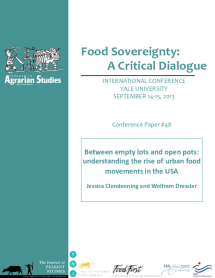Between empty lots and open pots Understanding the rise of urban food movements in the USA
As world food prices threaten expanding urban populations, there is a greater need for poor people to have access to and claims over how and where food is produced and distributed in cities. This is especially the case in marginalised urban settings. The global movement for food sovereignty has been one attempt to reclaim rights and participation in the food system and challenge corporate food regimes.

Autores
As world food prices threaten expanding urban populations, there is a greater need for poor people to have access to and claims over how and where food is produced and distributed in cities. This is especially the case in marginalised urban settings. The global movement for food sovereignty has been one attempt to reclaim rights and participation in the food system and challenge corporate food regimes. However, food sovereignty is often considered a rural issue for developing countries when, increasingly, its demands for fair food systems and rights are intensely urban in form and function. Through interviews with scholars, activists, nongovernmental and grassroots organizations in Oakland and New Orleans, we examine the extent to which food sovereignty has progressed in a US urban context as a concept, strategy and practice. We contrast and compare food sovereignty to other dominant US social movements such as food justice, and find that while many organisations do not draw on food sovereignty explicitly, the understandings and motives behind urban food activism are similar across movements as local actors draw on elements of each movement in practice. Overall, however, because of the different histories, geographic contexts, and relations to state and capital, food justice and food sovereignty differ as strategies and approaches. We conclude that the substance of food sovereignty in the US urban context is largely limited by neoliberal framing and political dampening, mainstreaming the approach and lessening its radical framework.
Jessica Clendenning is an Independent Researcher Ms. Clendenning’s interests revolve around agro-food systems (food security/sovereignty), rural livelihoods and agrarian change, land access and resource use, and forestry conservation and governance.
Wolfram Dressler is an Associate Professor, Forest and Nature Conservation Policy Group, Wageningen University, the Netherlands. Dr. Dressler’s interests lie in the political economy of landscape change, smallholder farming and human rights in northern and southern hemispheres.
Food Sovereignty: a critical dialogue, 14 - 15 September, New Haven.